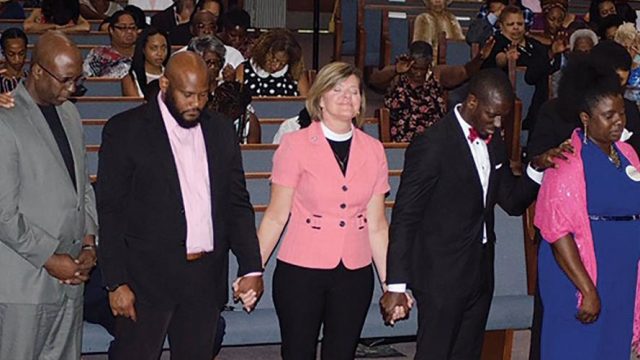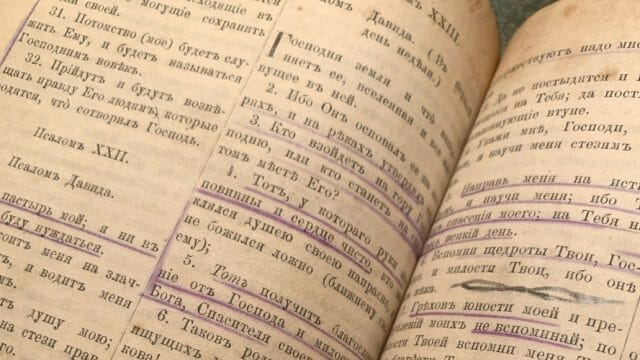God’s people always need counsel.

Five hundred years ago Martin Luther and other Reformers exalted the Holy Scriptures and challenged people to obey the Word. Many heeded this call, but some claimed that they were directly instructed by the Holy Spirit and did not need to submit to the authority of ancient writings. In the chapter “Progress of Reform in Germany” in The Great Controversy, Ellen White describes how the Reformers used God’s Word as a mighty weapon to overcome this opposition.
Today, an opposite heresy has gained a foothold in Christendom, with echoes heard even among some Seventh-day Adventists. In correctly extolling the Scriptures as the all-sufficient rule of faith and practice, some cry, “The Bible, the Bible only,” denying the continuing prophetic voice of the Holy Spirit in post-New Testament times.
Seventh-day Adventists have stated as one of our Fundamental Beliefs that the Holy Spirit was at work in the ministry of Ellen White, providing “comfort, guidance, instruction, and correction” for the church. We have pointed to the teaching of the Scriptures that the gift of prophecy did not cease with the apostles, but that it would be present in the “last days,” as prophesied by Joel (Joel 2:28, 29). John tells us that God’s people at the very end of time will possess the testimony of Jesus Himself, which the angel identifies as the Spirit of prophecy (Rev. 12:17; 19:10).
If one interprets sola Scriptura— “the Bible and the Bible only”—to mean that everything Christians need to pay attention to was already written 2,000 years ago—to the exclusion of what the Spirit says to the church today—their position holds no practical difference from the belief that the prophetic gift ceased with the apostles.
The Scriptures stand unique as God’s infallible revelation of His will. They are the standard of character, the test of experience, and the revealer of doctrines. If this is true, then why the writings of Ellen White? If the Bible is all-sufficient, what need is there for the continuing special guidance of the Holy Spirit?
Jesus presents the answer: “I still have many things to say to you, but you cannot bear them now. However, when He, the Spirit of truth, has come, He will guide you into all truth: . . . and He will tell you things to come” (John 16:12, 13). This promise was fulfilled in the life and writings of the apostles, but this testimony of the Spirit did not end with the apostles.
Scripture records how God instructed His people through special messengers to rebuke sin, to warn of coming dangers, to unmask Satan’s plans, and to reveal the results of misdirected choices— timely instruction from the Holy Spirit that was distinct from the light ultimately embodied in the canon, yet just as necessary.
God has not left His end-time church without the guidance of the Holy Spirit. And this has been remarkably demonstrated in the life and writings of Ellen White.
A PRESENT HELP
Let’s look at five areas in which the writings of Ellen White accomplish God’s purposes for us individually and as a church.
They reveal the enemy’s plans. In the days of Elisha, the king of Syria was convinced that his army had been infiltrated by Israelite spies because the enemy seemed to know in advance when and where he would attack. The king was told, however, that it wasn’t human intelligence, but Israel’s prophet— Elisha—to whom the Lord was giving “inside” information (2 Kings 6:8-12).
In Ellen White’s writings there is perhaps no greater theme than that of the great controversy between Christ and Satan. The Conflict of the Ages series shows how the conflict that began in heaven continues on our planet and in each person’s heart.
Bringing the instruction even closer, we are given insights into Satan’s strategies for his war against the remnant—the war described by John in Revelation 12:17. While we know that the devil is as a roaring lion seeking to devour his prey (1 Peter 5:8), the modern-day voice of the Spirit of prophecy unmasks his deceptions so that we can be more fully equipped to follow the apostle’s admonition to “resist” the enemy and “be vigilant” (verses 8, 9).
They show God’s hand in human history. Prophets interpreted events of their day in the light of God’s dealings with His people and surrounding nations. Daniel revealed God’s sovereignty in the succession of kingdoms that were to follow from Babylon to the breaking-up of the Roman Empire. In the cases of individuals, it often required the prophetic voice to explain sudden sicknesses or unexpected blessings.
Similarly, we find in Ellen White’s writings descriptions of events in which God was directly involved. One example is that of the sudden retreat of the superior Union army in the First Battle of Manassas in the U.S. Civil War in 1861. This was shown to Ellen White in vision, and what was inexplicable in human terms was revealed to be the work of angelic intervention.*
They set forth the results of choices. When Jerusalem was surrounded by the Babylonian army, King Zedekiah promised to spare Jeremiah’s life if he would tell him the truth about the future of his kingdom. Jeremiah laid out two options: Surrender to the king of Babylon and live, or fight and the city would be destroyed (Jer. 38:14-23).
A call to surrender was not what Zedekiah wanted to hear. He hoped Jeremiah would predict deliverance, announcing that God would fight for the protection of His people. Ultimately, Zedekiah made the wrong choice, and Jeremiah’s unpopular words were proven true—words that were counter to all the king’s advisers and military officials.
Today, while the will of God is broadly revealed in His Word, there are occasions when God’s people need supernatural guidance to lead them. Ellen White’s instruction about healthful living illustrates this in a practical way. Study after study has confirmed the positive results of choosing to live according to the principles of health outlined in her writings.
They rebuke sin. There is, perhaps, no greater illustration of the Spirit’s work in bringing conviction to the human heart than the prophetic word that Nathan spoke to David. David was already familiar with the seventh commandment and the sixth. He knew the writings of Moses.
God, in His mercy, sent His messenger to reveal the sin that David had been trying to conceal and to bring home to his heart the truth that he had been trying to ignore. Who knows whether David would have repented on his own, had it not been for the prophetic word communicated through Nathan?
Through the writings of Ellen White our lives are held up before us as in a mirror. In the light of the principles of God’s Word we are led to feel our deficiencies, to recognize our sinfulness, and to prayerfully accept the forgiveness and righteousness that Christ offers.
They apply Scripture. Early Christians had the writings of the Old Testament that they could study for themselves. Yet this did not preclude the working of the Spirit to draw their minds to a further application of particular passages, just as when Jesus announced that the words of Isaiah 61—setting free the captives—were being fulfilled that very day in their presence.
Today it is part of the work of the Holy Spirit to point out and apply particular themes and passages from the Word that have special significance for God’s people. Believing that the Holy Spirit enlightened Ellen White through the gift of prophecy, we are led to greater study of such passages, fulfilling God’s purpose in continuing to speak to His people through His Word.
*See Ellen G. White, Testimonies for the Church (Mountain View, Calif.: Pacific Press Pub. Assn., 1948), vol. 1, pp. 266, 267.








